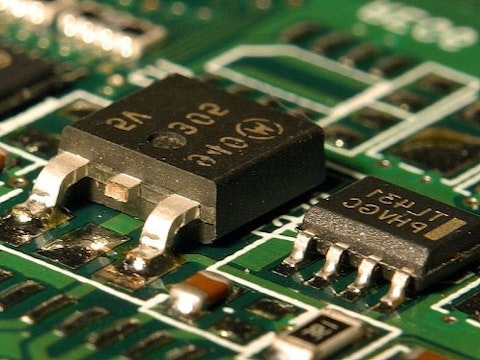With its shares having fallen by more than 50%, it would be an understatement to say that Micron Technology, Inc. (NASDAQ:MU) is having a rough 2015. The cyclical downturn in the memory chip industry and the resulting fall in DRAM prices is perhaps the main reason for the company’s shares taking a big hit, but other factors like what can now be called a failed bid by China-based Unigroup to acquire the company have also contributed to the significant declines that the stock has had compared to its peer group. Anyone who tracks Micron Technology probably knows that it was one of the favorite semiconductor stocks among hedge funds for quite some time. The conviction that hedge funds had in the stock was on full display during the first quarter of the year when several funds held on to the stock even when it collapsed by 23%.

Among the over 700 hedge funds we track, 100 reported having a stake in the company at the end of the first quarter, with the aggregate value of their holdings in the stock amounting to almost $7 billion. However, the mood of hedge funds towards the stock seems to have undergone a dramatic change during the second quarter, when the stock lost another 30.6%. The number of hedge funds among those we track that were long in the stock declined by 21 to 79 during the second quarter and the aggregate value of hedge funds’ holdings in the stock also saw a massive 46.4% quarter-over-quarter decline to $3.73 billion. Though the reduction in the number of hedge funds with holdings in the stock does give an indication of hedge funds’ sentiment toward Micron Technology, it doesn’t show the full picture, which we will do in the rest of this article.
We track hedge funds and prominent investors because our research has shown that historically their stock picks delivered superior risk-adjusted returns. This is especially true in the small-cap space. The 50 most popular large-cap stocks among hedge funds had a monthly alpha of about six basis points per month between 1999 and 2012; however the 15 most popular small-cap stocks delivered a monthly alpha of 80 basis points during the same period. This means investors would have generated ten percentage points of alpha per year simply by imitating hedge funds’ top 15 small-cap ideas. We have been tracking the performance of these stocks since the end of August 2012 in real time and these stocks beat the market by over 60 percentage points (118% return vs. the S&P 500’s 57.6% gain) over the last 36 months (see the details here).
To understand what hedge funds really think about Micron Technology, Inc. (NASDAQ:MU), one only needs to look at what two of the largest shareholders of the company at the end of the first quarter thought about it and what they did with their stakes in it during the second quarter. Let’s start with David Einhorn‘s Greenlight Capital, who was the largest shareholder of Micron Technology at the end of first quarter among the funds we track, with over 33.5 million shares. Writing in his first quarter letter to shareholders, Mr. Einhorn noted:
“We had one significant loser during the quarter. Micron Technology (MU) shares declined 23%. Weak PC sales drove a shortfall in DRAM demand leading to lower prices and reduced earnings. Our thesis is that the consolidated DRAM industry will act more rationally in the face of slower demand, moderating future cyclical declines and leading to higher profitability through the cycle. The current downturn is the first opportunity to test this thinking: either the industry will overproduce, fight for share, and kill profitability, or it will respond sensibly to slower cyclical demand and merit an upward revaluation. While we are watching industry behavior very closely, we believe our thesis is intact.”
Follow David Einhorn's Greenlight Capital
During the second quarter of the year, Mr. Einhorn showed full conviction in his thesis and increased his stake in Micron Technology by 14% to almost 38 million shares. Now let’s look at what Andreas Halvorsen of Viking Global, who was the second-largest shareholder of the company in our database on March 31 with 31.15 million shares, wrote in his first quarter letter to his shareholders:
“Micron, a leading manufacturer of memory semiconductors, was our biggest loser this quarter, costing VGE 0.6% and VLF 0.7%. Having ranked among our top five winners last year, Micron suffered from short-term PC DRAM pricing weakness in the first quarter, caused by a cyclical slowdown in the PC industry. We believe this weakness is temporary and of decreasing importance as industry demand will depend less on PCs and more on the high growth mobile and server end-markets. Our confidence is supported by an improved industry structure that we believe will lead to more stable margins, less volatile earnings, and higher shareholder returns. We initiated our investment in early 2013 on the back of this thesis and continue to believe strong long-term secular demand outweighs any short-term cyclical weakness. Of equal importance, we expect competitors to remain disciplined during this period of temporary weakness. As near-term pricing stabilizes and shareholder returns increase, we expect that investors will recognize the structural improvements in the industry and re-rate Micron from its current price-earnings multiple of 7.5x. We think there is significant upside to Micron’s share price and have chosen to keep it as a top 20 position in our portfolio.”
Follow Andreas Halvorsen's Viking Global
Unlike Mr. Einhorn, it seems the more than 30% decline in Micron Technology, Inc. (NASDAQ:MU)’s shares made Mr. Halvorsen seriously question his thesis on the stock, as he ended up selling his entire stake in Micron Technology during the second quarter. Apart from Greenlight Capital, there were several other hedge funds which increased their stakes in the company during the second quarter, including billionaire David E. Shaw‘s firm D.E. Shaw and Cliff Asness‘ AQR Capital Management.
Micron Technology is scheduled to report its 2015 fiscal third quarter earnings for the period ending August 31, on September 23. While analysts expect the company to have a significant drop in its EPS to $0.34 from $0.96 that it reported for the same quarter last year, it will be interesting to see how investors and especially hedge funds react to the company’s earnings because it is one of the few stocks right now in which the investment theses of several large hedge funds are in stark contrast to each other.
Disclosure: None




